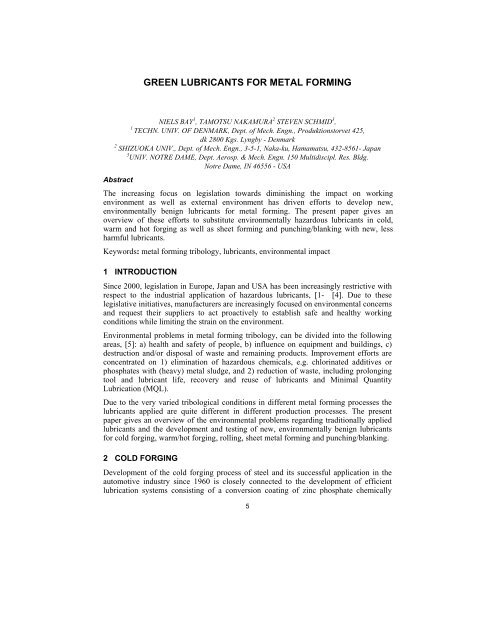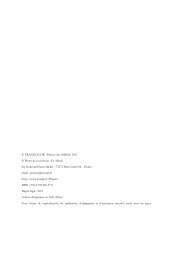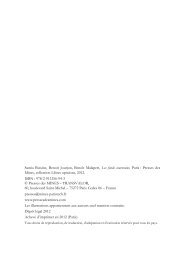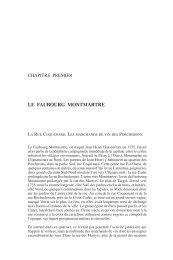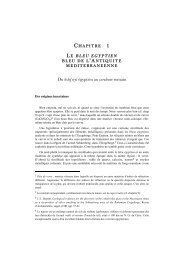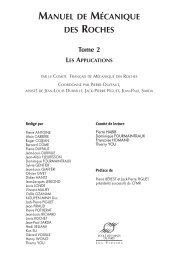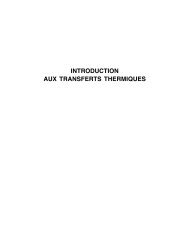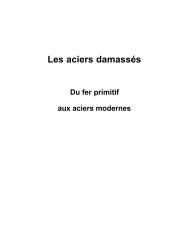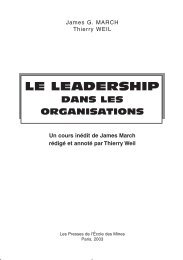Tribology of Manufacturing Processes - Presses des Mines
Tribology of Manufacturing Processes - Presses des Mines
Tribology of Manufacturing Processes - Presses des Mines
You also want an ePaper? Increase the reach of your titles
YUMPU automatically turns print PDFs into web optimized ePapers that Google loves.
GREEN LUBRICANTS FOR METAL FORMINGNIELS BAY 1 , TAMOTSU NAKAMURA 2 STEVEN SCHMID 3 ,1TECHN. UNIV. OF DENMARK, Dept. <strong>of</strong> Mech. Engn., Produktionstorvet 425,dk 2800 Kgs. Lyngby - Denmark2 SHIZUOKA UNIV., Dept. <strong>of</strong> Mech. Engn., 3-5-1, Naka-ku, Hamamatsu, 432-8561- Japan3 UNIV. NOTRE DAME, Dept. Aerosp. & Mech. Engn. 150 Multidiscipl. Res. Bldg.Notre Dame, IN 46556 - USAAbstractThe increasing focus on legislation towards diminishing the impact on workingenvironment as well as external environment has driven efforts to develop new,environmentally benign lubricants for metal forming. The present paper gives anoverview <strong>of</strong> these efforts to substitute environmentally hazardous lubricants in cold,warm and hot forging as well as sheet forming and punching/blanking with new, lessharmful lubricants.Keywords: metal forming tribology, lubricants, environmental impact1 INTRODUCTIONSince 2000, legislation in Europe, Japan and USA has been increasingly restrictive withrespect to the industrial application <strong>of</strong> hazardous lubricants, [1- [4]. Due to theselegislative initiatives, manufacturers are increasingly focused on environmental concernsand request their suppliers to act proactively to establish safe and healthy workingconditions while limiting the strain on the environment.Environmental problems in metal forming tribology, can be divided into the followingareas, [5]: a) health and safety <strong>of</strong> people, b) influence on equipment and buildings, c)<strong>des</strong>truction and/or disposal <strong>of</strong> waste and remaining products. Improvement efforts areconcentrated on 1) elimination <strong>of</strong> hazardous chemicals, e.g. chlorinated additives orphosphates with (heavy) metal sludge, and 2) reduction <strong>of</strong> waste, including prolongingtool and lubricant life, recovery and reuse <strong>of</strong> lubricants and Minimal QuantityLubrication (MQL).Due to the very varied tribological conditions in different metal forming processes thelubricants applied are quite different in different production processes. The presentpaper gives an overview <strong>of</strong> the environmental problems regarding traditionally appliedlubricants and the development and testing <strong>of</strong> new, environmentally benign lubricantsfor cold forging, warm/hot forging, rolling, sheet metal forming and punching/blanking.2 COLD FORGINGDevelopment <strong>of</strong> the cold forging process <strong>of</strong> steel and its successful application in theautomotive industry since 1960 is closely connected to the development <strong>of</strong> efficientlubrication systems consisting <strong>of</strong> a conversion coating <strong>of</strong> zinc phosphate chemically5


